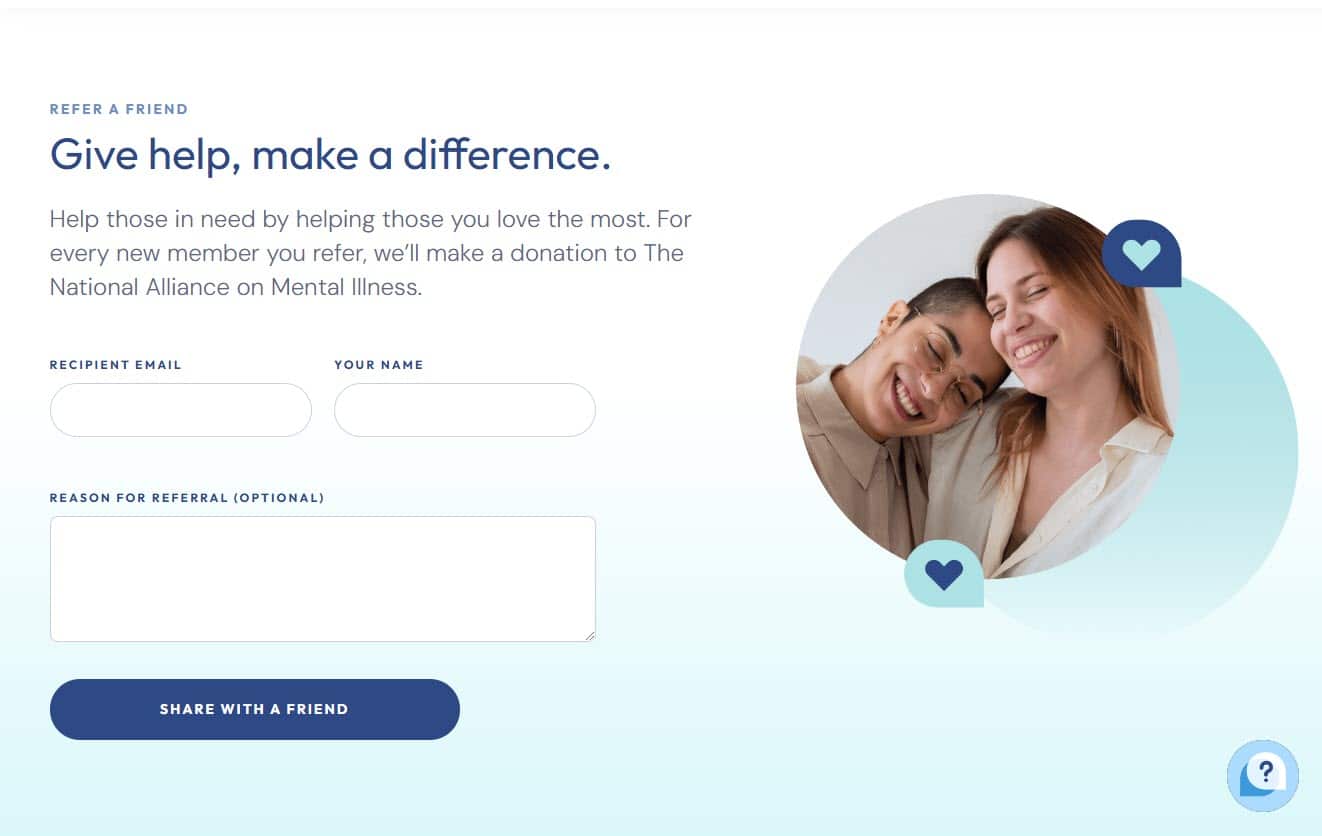One of the most effective methods to attract new counseling patients or clients is through word-of-mouth referrals. These referrals hold significant weight because they indicate that someone values your care enough to recommend you. And people tend to trust recommendations from peers – or experts – more than any other marketing approach when choosing a healthcare provider.
While maintaining a high standard of care is essential, referrals can sometimes feel unpredictable and challenging to monitor. However, implementing a counseling referral program can simplify and enhance the tracking of these referrals. While you may not be able to offer rewards for referrals, establishing a program to streamline and monitor the referral process is entirely feasible.
Here’s how counselors can effectively utilize a referral program, along with expert tips and best practices for achieving success.
What is a counseling referral program?
A counseling referral program simplifies the process for patients, clients, and other referrers to recommend your practice to others. It also allows you to monitor exactly where your referrals are coming from at a glance. With personalized referral links, individuals can easily share information about your services, and each referral will be associated with the person who made it. This method makes it straightforward for you to request referrals and recognize those who helped attract new patients or clients.
Counseling referral programs work well for:
- Mental health care providers/Mental health services
- Psychiatry and psychology
- Marriage and family counselors
- Career counselors
- Rehabilitation counselors for people with disabilities
- Health and wellness counselors
- Therapeutic counseling centers
- Addiction counselors
- Behavioral health counseling
- Financial counseling
- Grief counseling/Grief support services
- Any other counseling type
Benefits of counseling referral programs
Counseling referral programs are an excellent way to connect with people who are already inclined to recommend your services. By fostering trust, you can grow your patient community without the need for expensive marketing tactics. Here are some notable advantages of implementing counseling referral programs:
Enhanced visibility of your services: Referral marketing taps into the excitement of clients who share their positive experiences, and others who can validate the quality of your services. This type of word-of-mouth promotion not only boosts your services’ image but also provides social validation, drawing in potential patients or clients who want to improve their well-being.
Greater trust in your offerings: Referrals are often seen as more credible than advertisements or self-promotion – people generally trust the opinions of their peers and third-party experts over messages that come directly from your office. According to a Nielsen study, 84% of individuals regard referrals as the most trustworthy and effective form of advertising.
Generation of warm leads: When people recommend your services, they introduce you to individuals who genuinely need the counseling services you provide. These referrers are familiar with your services and can directly connect you with others who could benefit.
Higher conversion rates: A personal recommendation significantly boosts the likelihood that others will choose you for their counseling needs. Because of the trust involved, they are more inclined to engage with you. Research indicates that a personal endorsement can be up to 50 times more effective in driving decisions compared to traditional marketing methods.
Simplified referral tracking: Setting up a referral program allows for easy tracking of referral sources. With the right referral software and the links it generates, you can effortlessly attribute each referral to the person who made it.
Referral software for counselors [Free Tools]
These referral tools for counselors are a free and easy way to help you start your referral program.
Free Tools + Services:
- Create your own referral codes - [Referral Code Generator]
- Track referrals manually - [Manual Referral Tracker - Spreadsheet]
- Build referral links - [Referral Link Generator]
- Get best practices and actionable guidance - [Referral Program Workbook]
- Readiness Assessment - [Free Consult]
- Online referral software - [Free Trial]
Want a automated referral system for your counseling business? Uncover referrals in plain sight to smooth out business lulls, without losing focus on your real day to day work helping customers.
Check out our referral program software - done right.
Counseling referral program best practices
Now that you know you’re ready to start a referral program, follow these tips to launch a successful one:
Know your possible counseling referral sources
For the best counseling referral program, you’ll want your program to be available to all the possible sources that could send referrals your way.
- Current and past clients are a great source as they can vouch for the quality of your counseling services. The same goes for the family members of current and past clients.
- Medical professionals (doctors and nurses) are another awesome referral source, as their referral to you is highly trusted. Someone who receives a medical professional’s referral is much more likely to make an appointment with you.
- Other counselors, who don’t specialize in the same niche, could send referrals your way if they know of someone who could use your services. The same goes for social workers.
- Don’t limit your program to the above sources, either. You might know of other members of your community who’d be willing to send referrals your way.
Make yourself referable
To create a successful referral program, being genuinely referable is key. People are more inclined to share their positive experiences when they have strong reasons to do so. The quality of counseling you provide is the most significant factor in their willingness to recommend you, especially since offering incentives likely won’t be a legal or ethical option.
Strive to exceed expectations by crafting an experience that distinguishes you from others in the field. Do your patients feel valued during and after their appointments?
- Are you delivering personalized, high-quality counseling that addresses each person’s individual needs and helps them reach their goals?
- Do you remember and acknowledge their interests and aspirations, and make the clients feel valued?
- Are you working to reduce wait times?
- Is your waiting area inviting and comfortable?
- Are you receiving glowing five-star reviews, testimonials, and positive comments on social media?
- Do you achieve high scores on satisfaction surveys?
- Are people already praising you or referring friends even before you have a formal referral program in place?
If you can confidently answer yes to these questions, you’re well on your way to establishing a successful referral program.
Steer clear of rewards
Unlike many types of referral programs, most counseling referral programs can’t offer rewards.
In the US, the Anti-Kickback Statute prohibits you from paying out any rewards for referrals when someone’s counseling is at least partially covered by Medicare, Medicaid, government health insurance, or any other federally funded healthcare program.
And often, state laws are even stricter – some states don’t allow you to pay out referral rewards for any medical service, no matter how someone pays. Violating these laws can result in hefty fines.
This doesn’t just apply to monetary rewards like cash and gift cards – no rewards are allowed at all, not even a small gift.
Plus, if you’re getting referrals from a doctor, they can’t legally or ethically accept any rewards for a medical-related referral (including one to a mental health provider). So, you can’t give them rewards for recommending your mental health counseling.
Even if you aren’t in the medical space and your counseling isn’t federally funded, counseling codes of ethics still likely prevent you from offering rewards. This is because “kickbacks” like these can erode trust and prevent referrals from being fully based on your quality of counseling.
Don’t offer any referral rewards! It goes against ethical codes and may be illegal in your area.
- The American Counseling Association’s ethical code prohibits offering of referral rewards to anyone, as that’s considered fee splitting: “Counselors do not participate in fee splitting, nor do they give or receive commissions, rebates, or any other form of remuneration [related to] referring clients for professional services.”
- In addition, the American Psychology Association states that paying fees for patient referrals is unprofessional and unethical; they also caution that around half the states in the U.S. have laws prohibiting psychologists from giving or receiving referral fees.
- And the American Association for Marriage and Family Therapy (AAMFT) doesn’t allow marriage/family counselors to offer or accept any sort of referral fee.
If you’re outside of the U.S., familiarize yourself with your country’s laws and counseling ethics codes regarding referral program rewards. We still recommend that you steer clear of referral rewards if you’re based outside the United States, because of ethical considerations in the counseling industry.
Consider the alternatives to rewards
Don’t overlook referral programs just because you can’t provide rewards. Non-incentivized referrals are the most genuine form of recommendation. They demonstrate that clients are truly endorsing you because they want others to experience the same compassionate care. Moreover, you’ll benefit from the trust that people place in their friends, family, and experts – even without any incentives.
As an alternative to offering rewards, you could make a donation to a selected charity each time a referred patient attends their first appointment. People will value the chance to help others in need!
Additionally, make it a routine to send thank you notes – ideally handwritten and personal ones – whenever a referral leads to a new client.
Showing gratitude to customers for their referrals not only makes them feel valued but also motivates them to refer even more individuals. After all, when referrers feel valued, they are more likely to keep spreading the word about your services. In addition to the thank-you notes. you might also consider publicly recognizing their support on your social media platforms.
When people see that their referrals are appreciated, it fosters goodwill and strengthens their loyalty. Even without tangible rewards, a heartfelt ‘thank you’ can significantly encourage them to keep bringing new clients your way.
Know when to ask
One of the simplest and most effective methods to obtain referrals is to just ask for them. Since you’ve built a solid rapport with your clients (and with other professionals) and have had numerous personal interactions, reaching out should feel quite natural.
As far as asking clients, timing plays a key role when you request referrals.
Consider asking when clients:
- Leave a glowing review
- Share positive feedback in a survey
- Show appreciation during or after a session
- Achieve a significant goal
- Recommend your services to friends outside of the referral program
- Complete their series of counseling sessions and seem satisfied
- Give glowing remarks during a follow-up
If you know a client was pleased with your services, it’s an excellent opportunity to ask for a referral when you send the invoice for a completed session.
Know how to ask
Once you’ve identified the right moment, how do you go about making the request? If you’re concerned about finding the right words in person, it might be helpful to prepare and memorize a script. Alternatively, you can request referrals via email.
- Thank them for choosing you as their counselor, or for trusting you enough to have you in their referral network.
- Remind them of the factors that set you apart and the unique benefits of your services.
- Highlight the ideal client – the type of person who could benefit most from your services.
- Provide a clear link to your referral program to make it easy for clients to take action. If you’re speaking in person, hand them a card with the details – and a QR code to seamlessly connect their offline interest to your program online.
Make sharing easy
To enhance participation in your referral program, prioritize a user-friendly and straightforward sharing experience. Users should be able to access it with just a few clicks or taps. Once they reach your program page, the sharing process should be as smooth as possible:
- Divide the program instructions into three to four clear steps for better understanding.
- Emphasize the benefits of sharing. Even without rewards, you can highlight intrinsic advantages, like the chance to help someone achieve their goals.
- Remind participants of the unique benefits you provide.
- Keep your program page clean and organized – avoid overwhelming visitors with too much text.
- Make sure there’s a clear call to action (CTA) that encourages sharing.
Also, strive to minimize the effort required to make a referral.
- Offer various sharing options that fit common communication methods, such as email, social media, and text messages.
- Create a referral link that’s easy to copy and share anywhere—referral software can generate these links with ease.
- Prepare a friendly, pre-written message for referrers to send to potential clients, making it feel personal and welcoming. Include the unique benefits of your services.
- Ensure the program is accessible and easy to share on mobile devices.
Remove the need for users to log in
With Referral Rock’s One Click Access links, your clients can quickly start sharing your counseling services. This feature allows them to join the program automatically, without the hassle of signing up or filling out referral forms with lots of contact information.
Be sure to include One Click Access links in all your promotional emails about the referral program, such as newsletters and transactional emails – not just those specifically about referrals.
Referral Rock also lets both new and existing members access their referral portal using popular social logins like Google and Facebook, making it easier for them since they won’t need to remember a password.
Promote your referral program
To increase engagement in your referral program, get more referrals, and boost revenue, it’s essential to promote your program via various channels:
- Reach out to current and past clients, and everyone else in your possible referral network, by sending targeted emails regarding your referral program. This strategy not only attracts new referrers but also keeps the program at the forefront of everyone’s minds. It is advisable to send these emails on a monthly or quarterly basis.
- Include brief mentions of your referral program in newsletters and other routine communications.
- Encourage referrals at the end of appointments or during discussions with clients.
- Reference your program in the emails that accompany invoices.
- Provide printed referral flyers that include a QR code linking to your program page, enabling a seamless transition from offline to online sharing.
- Post “refer a friend” signs within your office, featuring a QR code for easy access to the program.
- Incorporate a note about your program in your email signatures.
- If you have a client portal, integrate referral promotions directly within it, including direct links for convenient access.
- Display a prominent banner or hero image on your website’s homepage that links directly to your referral landing page.
- Consider employing subtle promotional techniques on your website, such as adding a link in the footer or menu. If users can easily locate and access it, they are more likely to participate in your program.
- Share updates about your referral program on your social media channels.
- Leverage Referral Rock’s Monthly Summary emails to engage current program members, offering them a personalized overview of their referrals.
Choose the right referral software
Since your primary focus is on providing excellent counseling services, you probably have limited time to manage a referral program manually. This is where referral software becomes crucial. These tools streamline and automate the referral process, making it easy to track referrals and pinpoint their sources. They also offer valuable insights into your referral program, helping you evaluate its effectiveness and make necessary adjustments.
Plus, these tools generate unique links that make it easier to promote your program through social media, email, and other channels.
Referral Rock enhances the creation, tracking, and marketing of your referral program, making it an indispensable resource for anyone looking to run a successful referral campaign.
With Referral Rock, you can:
- Easily monitor referrals: Each participant receives a unique referral link, allowing you to trace the source of every referral. Customers can also track their referral activity through personalized dashboards.
- Automate your marketing: Keep your customers engaged with automated promotional emails and simplify sharing with password-free links.
- Integrate with essential tools: Seamlessly connect Referral Rock with over 50 different applications.
- Assess program performance: Quickly evaluate how your program is doing and make data-driven enhancements.
- Get started quickly: With Referral Rock, you can launch your program in just a few days, with expert assistance available throughout your setup and launch process.
Start a counseling referral program
A counseling referral program allows you to utilize personal recommendations to attract new patients. Establishing this program offers several advantages, such as easy tracking of referrals, enhanced visibility for your services, and consistent growth in your client base. To differentiate yourself, prioritize delivering an exceptional experience, promote your program actively, and ensure that sharing is as effortless as possible.




